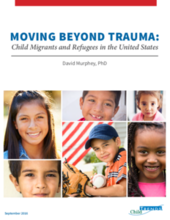This report brings together demographic data and other research findings on distinct groups of immigrant children, in order to focus on their common challenges. This report finds that more than 127,000 children, with or without their parents, will seek refuge in the United States from abroad this year. These children share a common experience of trauma, which often accompanies them on their journey to this country and for months or years after they arrive. An estimated 37,500 children arriving in 2016 will be officially designated as refugees or asylees, statuses which grant them eligibility for health care and social services immediately upon arrival, and eligibility for citizenship after 5 years. In contrast, nearly 3 times as many children (about 90,000) will arrive without legal status, first apprehended by the Border Patrol, then subject to a chain of administrative procedures that offers few protections and may include detention for prolonged periods; this presents a great many hazards to their well-being—including re-traumatization.
The report recommends that children should be treated in a manner that avoid re-traumatization. The report also recommends that all children, regardless of their formal immigration status, be accorded basic human rights of physical safety and due process, including legal representation during asylum processing and removal hearings.

